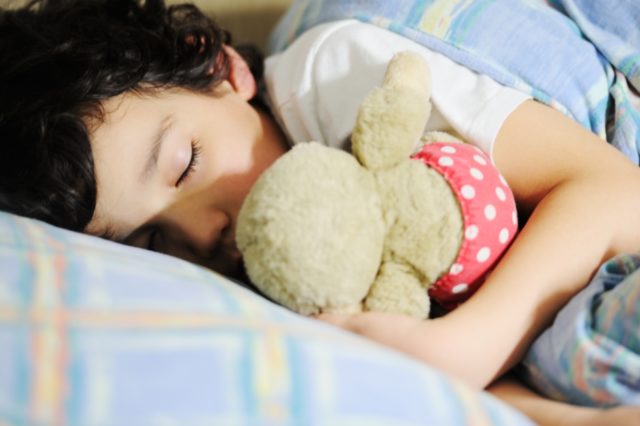
A good night’s sleep is not all about getting to sleep but also staying asleep for the whole night. If your kids keep waking up in the middle of the night or have a problem waking up by themselves in the morning, this could be an indication that they are not getting enough, quality sleep.
How Fast Do Kids Fall Asleep?
How fast your kid will fall asleep will depend on a number of factors such as how sleepy he/she is and also on their day and bedtime routine. Some routines help kids wind down before getting to sleep. However, most kids will take an average of about 20 minutes after getting to bed to fall asleep.
Sleep Cycles
Children go through three sleep cycles. These cycles revolve between light, deep and dream sleep.
Normally, children will experience their deep sleep during their 1st few hours of sleep. The next phase of the night consists of light and dream sleep.
Although they may not be aware, children wake up briefly as they rotate between these sleeping cycles. To remain asleep for the rest part of the night, kids need to be able to get back to sleep by themselves after the brief waking episodes. However, this fails to happen in some kids, and this is where the problem of sleeplessness sets in.
In this guide, you will find some useful and practical tips that can help your kids get quality and sound sleep all night long.
How Much Sleep Does Your Kid Need?
Before we delve deeper into the subject, it is crucial to point out that, the amount of sleep your kid will need might be different from another kid’s. This will mostly be determined by factors such as their development stage and age. According to the National Sleep Foundation, kids in the following age groups will require the corresponding hours of sleep time:
- Infants, 0-3 months– 10.5 to 18 hours a day. No regular sleeping schedule.
- Babies, 4-11 months- Should have naps ranging from half an hour to 2 hours throughout the day — 9-12 hours of night sleep time.
- Toddlers, 1-2 years– 11-14 hours of sleep time.
- 3-5 years– 11-13 hours. At this age, their naps should be less often and shorter.
- 6-13 years- 9-11 hours.
- Fourteen years and up- 8-10 hours.
Tips to Help Your Child Sleep Better
- Limit screen time before bed
During the night, our brain produces hormones (naturally) that help us get to sleep. However, it is thought that the light and glow from our electronic devices such as TVs and smartphones may have an impact on our brain hence hindering this process.
It is therefore crucial that you keep all the electronic devices out of your children’s reach during sleeping hours. If possible, get your children to keep away their electronic devices such as video games, tablets, etc. an hour before going to bed.
- Set an individualized bedtime routine
Although we have already mentioned that most school going children will need between 9-11 hours of sleep, it is crucial to note that sleep patterns and needs vary from one child to another. This means that some children’s sleep patterns may not change no matter what ‘rules’ you impose.
For instance, if your kid is an early riser, making them sleep late into the night may not affect their waking time. On the other hand, if your kid stays late into the night, forcing them to get to bed earlier may not work.
For this reason, it is vital to understand how much sleep your kid needs to wake up energized, refreshed and ready for the day’s activities. This will enable you to come up with a customized sleep pattern that will work for your kid.
- Set a daily wake-up time
Because you already know how much sleep your kid needs, deciding what time they should sleep and wake up should not be hard.
Although kids may convince you to allow them to sleep a little bit more on holidays and weekends, it is crucial that you don’t give in. This is because those few extra hours may end up affecting your kid’s sleep time which will consequently affect their wake-up time the following day. This may seem a little harsh, but it is important that you try and maintain their sleep and wake-up time even on weekends and holidays.
- Build a regular bedtime routine
A relaxing wind-down routine allows your children to realize that it is time for sleep. At this time, your kids should not participate in too active or exciting activities. This routine should not be comprised even on weekends. This is because, if you let your kids stay up late into the night because it is a weekend, then you will have a lot of trouble trying to get them back on track for the week. If they have to watch a game or a weekend late night movie, let it be within 30 min-1 hour of their normal bedtime routine.
- Let them exercise
According to experts, active activities or exercises helps kids get to sleep easily. Not only can kids participate in sports or run around but they can also go to the park or just take the dog for a walk.
Although your kids may participate in other passive activities such as watching a movie or playing a video game, doctors insist that they must also get at least 60 minutes of physical or active exercises daily.
- Keep their stress levels down
Cortisol, “or the sleep hormone” is another hormone that affects our sleep. According to experts, high levels of cortisol prevents a kid’s body from shutting down, leading to difficulties in sleeping.
It is therefore vital that you try to keep the level of stress in your kids low by keeping the lights dim and maintaining a quiet environment.
- Look for early signs of a sleep disorder
If you have tried everything and your kid is still not sleeping, keeps having night terrors or nightmares, then this could be a sign of a sleep disorder, and you should see a doctor.
There you have it; tips to help your kids sleep better. We hope that after implementing all or some of these tips, cases sleeplessness in your kids will be a forgotten history!












